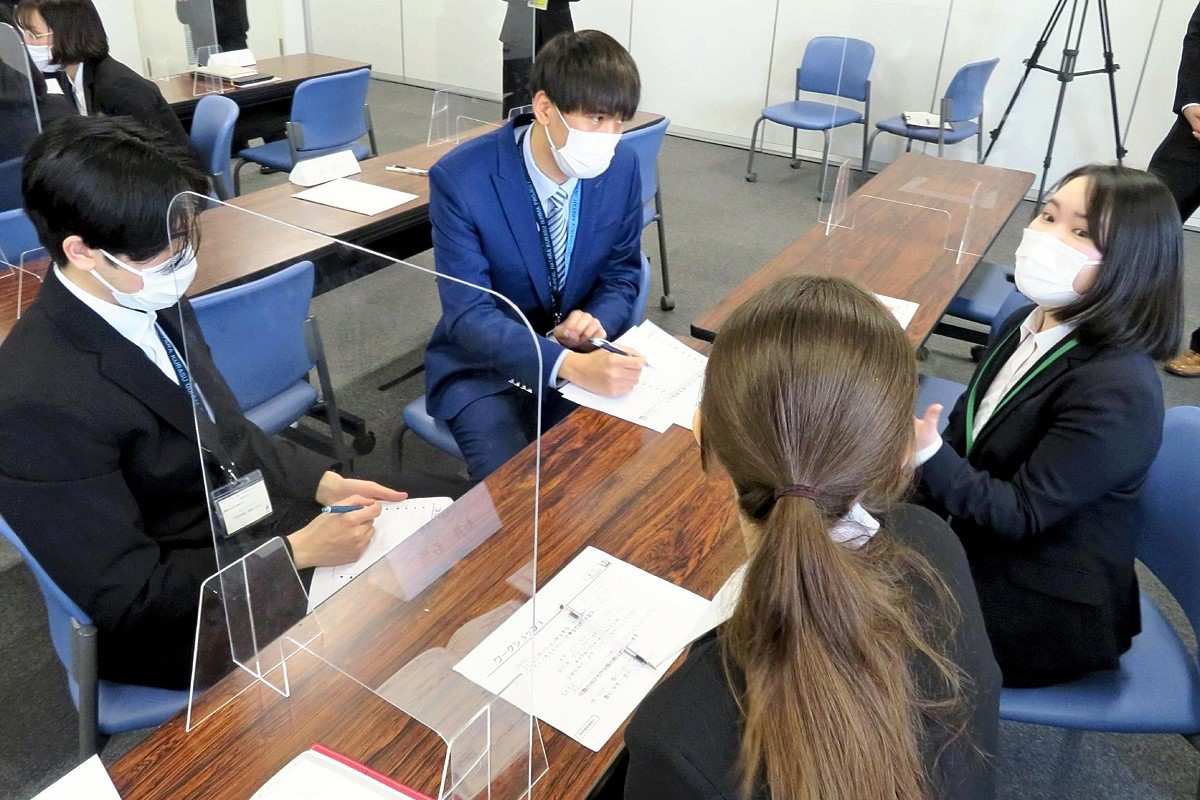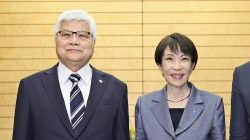
International students participate in an internship program held by Seven-Eleven Japan Co. in Maebashi.
6:00 JST, April 24, 2023
Efforts are growing to help international students in Japan find jobs at domestic companies. Universities in particular are developing programs to help overcome the hurdles such students face, such as job-hunting activities that are specific to Japan and the Japanese language skills needed for business situations.
The number of international students coming to Japan to study has exceeded the pre-COVID level, due chiefly to the easing of entry restrictions imposed during the pandemic. Moves to help them find jobs are aimed at helping Japanese companies that are struggling with a shortage of talented staff, and at reinvigorating local economies.
Hands-on training
Nguyen Thi Mai Phuong, 22, is a first-year graduate school student at Gunma University who came from Vietnam. In February, she participated in a two-week internship program at a regional office of Seven-Eleven Japan Co. in Maebashi. She listened to lectures about the franchise system, given by staff dispatched from the company’s head office, and also experienced store operations.
When Nguyen was a child, she became interested in Japan through the popular anime Doraemon and decided to study in Japan to learn about its culture and the latest science and technology. Her major is mechanical engineering.
“Gunma is a quiet, comfortable place to live, and there are many factories where I can utilize my major. I want to find a job here,” Nguyen said.
An official at Seven-Eleven Japan said, “She’s more forceful than a Japanese person and speaks up without hesitation.”
Revitalizing local economies
This internship is part of a program planned by Glocal Hatara-Kurasu Gunma Project (GHKG), a job-hunting support organization for international students. The program involves 250 hours of training over a year, including instruction in business Japanese and an internship program developed jointly with local firms.
The Japanese language classes teach students about business-related topics, such as negotiating within a company and writing thank-you letters.
There are even lectures about learning the basics of job-hunting in Japan, and how to be interviewed for a job. Of the 30 foreign students who participated between fiscal 2018 and fiscal 2020, 29 people found jobs in domestic companies. Nineteen were hired by companies operating in Gunma Prefecture.
In 2020, an electronics parts manufacturer hired a Chinese woman who had participated in the program. “She has good communication skills and has shown a strong presence. We’re now increasing the number of foreign students we hire,” an official at the manufacturer said.
GHKG was established in 2017. It is a consortium of such entities as Gunma University and eight other universities and one technical college in the prefecture, as well as the prefectural government, the municipal governments of five cities and one village, and local chambers of commerce and industry.
The organization was created in response to the challenges faced by regions without huge cities, including the difficulty in finding manpower for companies due to the exodus of young people to the Tokyo metropolitan area and the reduced vitality of local economies.
Job-hunting customs
Yet according to the Japan Student Services Organization (JASSO), the domestic employment rate for international students stood at 48% in fiscal 2018, still below the government’s target of 60% by fiscal 2033.
Foreign students who take part in job-hunting activities are said to have many concerns about their Japanese language abilities and Japan’s particular employment practices, such as the mass hiring of new school graduates.
According to a 2022 survey taken by employment information company DISCO, foreign students’ biggest concern is “whether I can make myself understood in Japanese,” cited by 55% of respondents. This was followed by “whether I can build relationships in the workplace,” chosen by 43.2%.
In an attempt to alleviate these concerns, the Education, Culture, Sports, Science and Technology Ministry launched the Program for Enhancing Employment of International Students in fiscal 2017, subsidizing the operating expenses of special programs such as the one being implemented by GHKG.
Sustainable University Consortium for Career Empowerment and Societal Supports (SUCCESS), which provides international students with Japanese language education and internship programs, is led by Kansai University and comprises 17 member universities throughout Japan, including the University of Tsukuba and the University of the Ryukyus.
Various courses are offered by each school and shared online, and approximately 100 international students participated in fiscal 2022. The consortium aims to increase the number of member universities to 50 in the future.
Kanazawa University has been collaborating with universities in three prefectures in the Hokuriku region — Ishikawa, Toyama, and Fukui — since fiscal 2022, holding company information sessions for international students.
COVID-related restrictions on entry to Japan were eased in the spring of 2022, and the number of foreign nationals newly arriving to study in Japan totaled 167,128 in 2022. This exceeded the 124,269 registered in 2018, the year before the pandemic occurred.
Securing IT talent
The Japanese government is also striving to help overseas science students find jobs at Japanese and Japanese-affiliated companies.
The Economy, Trade and Industry Ministry estimates there will be a shortage of up to 790,000 people in IT manpower in 2030. This fiscal year, the ministry began holding job fairs for science students, featuring Japanese companies, in locations including eastern Europe, where IT education is flourishing.
It is hoped that these students will work for Japanese-affiliated firms operating overseas.
The education ministry will also begin this fiscal year subsidizing programs designed to support international students studying in digital and related fields in their search for a job in Japan.
Related Tags
Top Articles in Business
-

Japan, Italy to Boost LNG Cooperation; Aimed at Diversifying Japan’s LNG Sources
-

Narita Airport, Startup in Japan Demonstrate Machine to Compress Clothes for Tourists to Prevent People from Abandoning Suitcases
-

Asics Opens Factory for Onitsuka Tiger Brand in Western Japan
-

JR Tokai, Shizuoka Pref. Agree on Water Resources for Maglev Train Construction
-

KDDI Opens AI Data Center at Former Sharp Plant in Osaka Prefecture; Facility Will Provide Google’s Gemini AI Model for Domestic Users
JN ACCESS RANKING
-

Japan Institute to Use Domestic Commercial Optical Lattice Clock to Set Japan Standard Time
-

China Eyes Rare Earth Foothold in Malaysia to Maintain Dominance, Counter Japan, U.S.
-

Man Infected with Measles May Have Come in Contact with Many People in Tokyo, Went to Store, Restaurant Around When Symptoms Emerged
-

Japan, Qatar Ministers Agree on Need for Stable Energy Supplies; Motegi, Qatari Prime Minister Al-Thani Affirm Commitment to Cooperation
-

Australian Woman Dies After Mishap on Ski Lift in Nagano Prefecture






















